Related Research Articles

Francis Yoshihiro Fukuyama is an American political scientist, political economist, international relations scholar and writer.

The End of History and the Last Man is a 1992 book of political philosophy by American political scientist Francis Fukuyama which argues that with the ascendancy of Western liberal democracy—which occurred after the Cold War (1945–1991) and the dissolution of the Soviet Union (1991)—humanity has reached "not just ... the passing of a particular period of post-war history, but the end of history as such: That is, the end-point of mankind's ideological evolution and the universalization of Western liberal democracy as the final form of human government." For the book, which is an expansion of his essay "The End of History?", Fukuyama draws upon the philosophies and ideologies of Georg Wilhelm Friedrich Hegel and Karl Marx, who define human history as a linear progression, from one socioeconomic epoch to another.
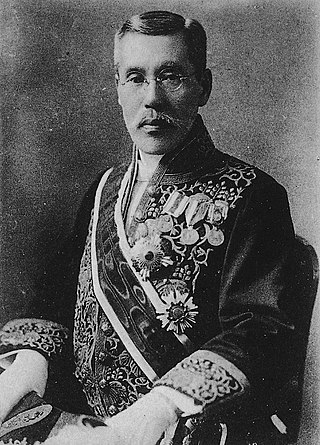
Kiichirō Hiranuma was a prominent right-wing Japanese politician and Prime Minister of Japan in 1939. He was convicted of war crimes committed during World War II and was sentenced to life imprisonment.
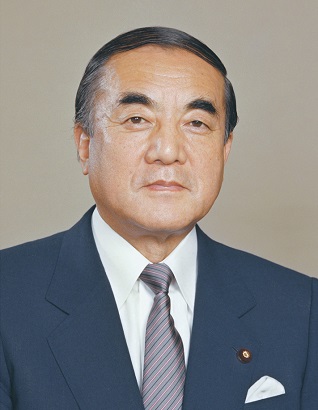
Yasuhiro Nakasone was a Japanese politician who served as Prime Minister of Japan and President of the Liberal Democratic Party from 1982 to 1987. He was a member of the House of Representatives for more than 50 years. His political term was best known for pushing through the privatization of state-owned companies and pursuing a hawkish and pro-U.S. foreign policy.

Chie Nakane was a Japanese anthropologist and Professor Emerita of Social Anthropology at the University of Tokyo.

Chrysanthemums, sometimes called mums or chrysanths, are flowering plants of the genus Chrysanthemum in the family Asteraceae. They are native to East Asia and northeastern Europe. Most species originate from East Asia and the center of diversity is in China. Countless horticultural varieties and cultivars exist.
"Asian values" is a political ideology that attempts to define elements of society, culture and history common to the nations of Southeast and East Asia. It aimed to use commonalities – for example, the principle of collectivism – to unify people for their economic and social good. This contrasted with perceived European ideals of the universal rights of all individuals. The concept was advocated, particularly in the 1990s, by Mahathir Mohamad and by Lee Kuan Yew, as well as other Asian leaders. It has been often used by nondemocratic leaders to justify repression of political opponents, which has been described as violating their human rights, through the justification that "human rights are not part of Asian values".

Japanese nationalism is a form of nationalism that asserts the belief that the Japanese are a monolithic nation with a single immutable culture, and promotes the cultural unity of the Japanese. Over the last two centuries, it has encompassed a broad range of ideas and sentiments which have been harbored by the Japanese people in relation to their native country, its cultural nature, its political system, and its historical destiny. It is useful to distinguish Japanese cultural nationalism from political or state-directed nationalism, since many forms of cultural nationalism, such as those which are associated with folkloric studies, have been hostile to state-fostered nationalism.
Nihonjinron is a genre of historical and literary work that focuses on issues of Japanese national and cultural identity.

Girls Bravo is a Japanese manga series written and illustrated by Mario Kaneda and serialized from 2000 to 2005 in Shōnen Ace by Kadokawa Shoten. The story focuses on a high school boy who is allergic to girls who is transported to a mysterious world with a mostly female population; when he returns, one of the girls from that world becomes his housemate.
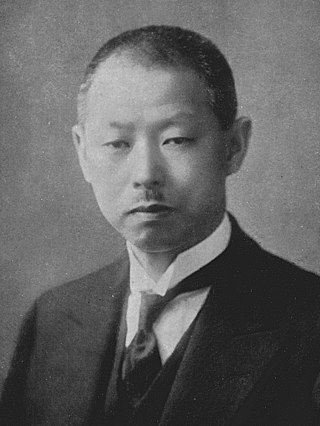
Yoshisuke Aikawa was a Japanese entrepreneur, businessman, and politician, noteworthy as the founder and first president of the Nissan zaibatsu (1931–1945), one of Japan's most powerful business conglomerates around the time of the Second World War.
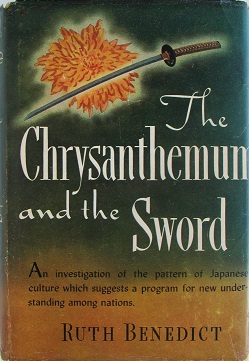
The Chrysanthemum and the Sword: Patterns of Japanese Culture is a 1946 study of Japan by American anthropologist Ruth Benedict compiled from her analyses of Japanese culture during World War II for the U.S. Office of War Information. Her analyses were requested in order to understand and predict the behavior of the Japanese during the war by reference to a series of contradictions in traditional culture. The book was influential in shaping American ideas about Japanese culture during the occupation of Japan, and popularized the distinction between guilt cultures and shame cultures.

Karel van Wolferen is a Dutch journalist, writer and professor, who is particularly recognised for his knowledge of Japanese politics, economics, history and culture.
Iwanami Shoten, Publishers is a Japanese publishing company based in Tokyo.
The Enigma of Japanese Power is a political textbook by Karel van Wolferen. The book was written in 1989, and is a critical account of the business, social, and political structure of Japan. The title of the book addresses the mystery and awe that many Americans and Europeans had toward the impressive Japanese business achievements at that time. Upon publication the book was greeted with criticism in Japan, but has come to be regarded as one of the most important business books about Japan in the west. As a result, the book is frequently referenced by other textbooks.
America at the Crossroads: Democracy, Power, and the Neoconservative Legacy is a 2006 book written by Francis Fukuyama.
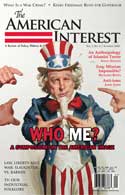
The American Interest (AI) was a bimonthly magazine focusing primarily on foreign policy, international affairs, global economics, and military matters.
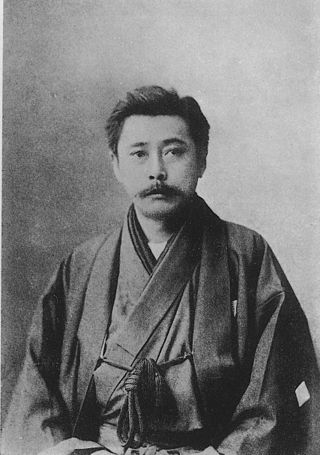
Kuga Katsunan was a Japanese journalist. He launched the newspaper Tokyo Dempō and further developed it into the newspaper Nippon, advocating nationalism, and developed speech activities to promote nationalism that criticized Europeanization, in cooperation with the magazine Nihonjin published by Seikyō-sha.
Gaman (我慢) is a Japanese term of Zen Buddhist origin which means "enduring the seemingly unbearable with patience and dignity". The term is generally translated as "perseverance", "patience", or "tolerance". A related term, gamanzuyoi, a compound with tsuyoi (strong), means "suffering the unbearable" or having a high capacity for a kind of stoic endurance.
Political decay is a political theory, originally described by Samuel P. Huntington, which describes how chaos and disorder can arise from social modernization increasing more rapidly than political and institutional modernization. Huntington provides different definitions for political development and describes the forms of political decay according to the various definitions. Huntington focuses primarily on political development as modernization and institutionalization. However, he points to the different definitions of political development as being arbitrary ways to understanding the rise of political systems and the relationship between the political systems of different nations.
References
- ↑ Sung-won Suh. Book Review Global Asia: A Journal of the East Asia Foundation, Fall, 2010
- 1 2 3 Japan Focus: Douglas Lummis japanfocus.org
- 1 2 3 4 Radical Democracy book ecobooks.com
- 1 2 Karel van Wolferen. "The most monstrous lie of the twenty-first century" karelvanwolferen.com, jottings, articles, books, 19 Sep. 2011
- ↑ Author Bios: C. Douglas Lummis thenation.com
- ↑ Francis Fukuyama. "Radical Democracy, C. Douglas Lummis" Foreign Affairs, September/October, 1996